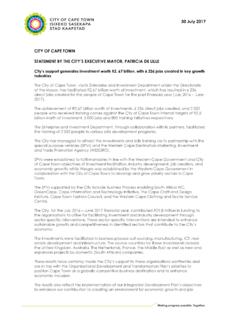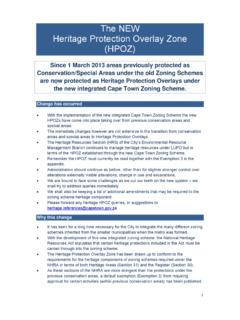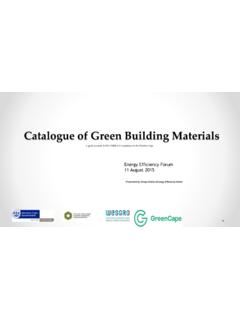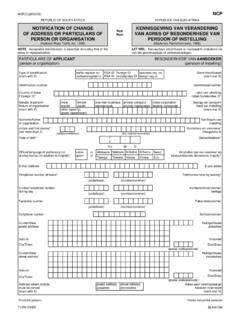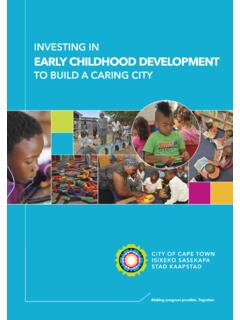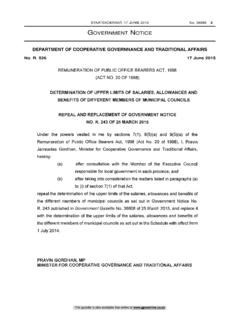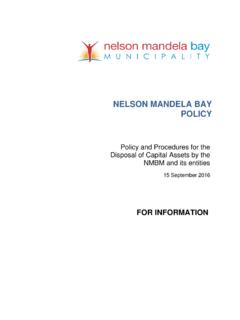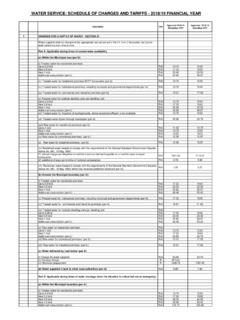Transcription of Solid Waste Management Dept Integrated Waste …
1 Solid Waste Management Dept Integrated Waste Management and Service Delivery Sector Plan Solid Waste Management Sector: City of Cape Town The City of Cape Town Council's Solid Waste Management (SWM) Department is the Dept delegated by Council to ensure that such municipal services are provided as required per the SA Constitution, Schedule 5B. The SWM Dept is thus the regulator of Waste Management activities at a municipal level in Cape Town, and is one of the providers of Waste Management services in the metropolitan municipal area of approx 2 400 km2 and approx million people (2006 estimate). The Dept's services and those of external service providers have to be aligned and transformed in accordance with the statutory reforms related to the aims of the National Environmental Management : Waste Management Bill, No 39 of 2007, and the current National Waste Management Strategy based on Integrated Waste Management (IWM).
2 This requires additional services over and above the present Constitutional obligations of municipalities to ensure cleaning/cleansing, collection and Waste disposal services. Integrated Waste Management in Cape Town is guided by the Council's IWM policy and executed via a statutory, detailed IWM Plan that is part of the Council's Integrated Development Plan (IDP). Principles and information about the Management of Waste , service standards and levels, and services provided by the Council are also contained in the IWM policy. The overarching policy objectives are aimed at minimizing Waste being produced that is currently disposed at landfill sites or is illegally dumped, to conserve resources and the environment, to ensure basic Waste Management services, as well as reduce human and environmental health, and socio-economic impacts.
3 Tariff information for the Council's Waste Management services is contained in the Council's Tariff Schedule that is amended annually or by special Council resolution. Waste minimisation should be measured by the quantity of Waste actually landfilled versus the quantity that is successfully diverted from landfills ( the saving on landfill airspace). The challenge is to continually improve residents' equitable access to basic Waste collection services despite the challenges of a growing city and a constrained budget. This is measured by the number of residents with access to these services. City cleanliness is highly visual, and is monitored by a photometric index that measures littering qualitatively, and which could be augmented by the quantum of illegal dumping. The Waste Management and minimisation objectives and outcomes have to be achieved concurrently, and should be Integrated through various joint initiatives with residents, commerce and industry.
4 To give effect to sustainable Integrated Waste Management services, and to regulate such activities, the Council's Service Authority role must be enabled via a new Council by-law that is likely to be promulgated in 2008. This will conclude Cape Town's municipal law reform for Waste Management that was needed as a consequence of the municipal restructuring in 2000. I Waste Plan SWM 17_01_08 (final).doc Page 1 of 12. To ensure ongoing, effective Waste Management , the most important tasks at hand relate to replacing almost-redundant infrastructure (full landfills) by creating new infrastructure that will accommodate expected population and economic growth, and to improve access to basic services in informal areas. This includes a new landfill and a system of transfer stations. To ensure Waste minimisation, the key tasks are to create Waste minimisation and capital infrastructure partnerships that will lead to initiatives for reducing the amount of Waste and the Council's long-term capital expenditure requirements.
5 The Waste minimisation strategy is based on various initiatives that are dependent on partnerships with external entities involved in manufacturing, production, alternate technologies to landfill and recycling. Many of the initiatives have good potential for the creation of a sustainable recycling industry that will lead to further job creation in support of local economic growth targets. Vision for Waste Management in Cape Town The long-term vision for the Cape Town Waste Management sector is to improve access to basic services for residents to as close as possible to 100% as constrained by available funds and unplanned growth;. to develop multiple Integrated initiatives that will reduce Waste and the associated impacts substantially as well as contribute to and support economic development.
6 To improve the income generated by the Council's Waste services;. to optimise the utilisation of the Council's resources and capital; and to generate other sources of funding for Integrated Waste Management through Public-Private Partnerships within the Cape Town municipal area. National/Provincial Legislative Requirements The SA Constitution, Schedule 5B requires municipalities to provide cleaning/. cleansing, Waste collection and disposal services and infrastructure. The National Waste Management Strategy, and the White Paper on Integrated Pollution and Waste Management for South Africa (informed by the statutory principles affecting environmental Management and conservation), are the national policy and regulatory documents that define how to achieve an Integrated Waste Management approach, focusing on Waste minimisation and service delivery.
7 Final public comment on the National Environmental Management : Waste Management Bill, No 39 of 2007 was accepted in Parliament in November 2007. The Bill is likely to become the framework legislation for the regulation of Waste Management activities in South Africa during 2008. The Local Government Municipal Systems Act, requires a Council to formulate policies for which the Integrated Waste Management Policy was developed in 2006. In terms of of the Waste Management Bill, a municipality must formulate an IWM Plan as a means of minimizing Waste disposal, providing services, preserving and extending the use of landfill sites and protecting the health and the environment. I Waste Plan SWM 17_01_08 (final).doc Page 2 of 12. The most important legislative requirements for these objectives are contained in the following statutes and national policies: 1.
8 The SA Constitution ( : Right to a safe and healthy environment);. 2. The National Environmental Management Act (Act 107 of 1998) (NEMA);. 3. The Environment Conservation Act (ECA) (Act 73 of 1989, amended . relevant sections not repealed yet);. 4. National Environmental Management : Waste Management Bill, No 39 of 2007. overarching Waste Management legislation once promulgated;. 5. White Paper on Integrated Pollution and Waste Management for South Africa (Government Gazette 20978, 17 March 2000) DEAT national Waste Management policy;. 6. National Waste Management Strategy (DEAT, 1999);. 7. The National Water Act (Act 36 of 1998);. 8. The Hazardous Substances Act (Act 15 of 1973) & Regulations;. 9. The National Health Act (Act 63 of 1977);. 10. The Occupational Health and Safety Act (Act 85 of 1993) and Regulations.
9 11. The Road Traffic Act (Act 29 of 1989);. 12. The Local Government Municipal Systems Act (Act 32 of 2000);. 13. The Local Government Municipal Structures Act (Act 117 of 1998);. 14. The Local Government Municipal Finance Management Act (Act 56 of 2003);. 15. Local Agenda 21 (Sustainable Development principles at a local government level SA is a signatory to the UN's Agenda 21). Current Status Council's IWM Policy, which underpins the IWM Plan with the overarching aim of striving towards the 2001 Polokwane Declaration's zero Waste to landfill goal by 2022, was adopted by Mayco in 2006/2007 (MC08/05/06). A statutory Sector Plan and amended IWM Plan that was adopted as part of the IDP in 2007/08, is now being reviewed and updated. This Sector Plan is aimed at complying with statutory requirements for local government and environmental Management , and achieving targets that are set in the Council's IWM Policy.
10 It aligns Waste Management activities in Cape Town with national, provincial and Council priorities. Council's IWM by-law for the regulation of Waste Management activities within the City's jurisdiction is currently being drafted as part of the required institutional framework for Waste Management , as defined by the Waste Management Bill. A. public participation process for the draft by-law will be undertaken in 2008. Ideally, the new by-law should be promulgated after the Bill has been promulgated. It is also anticipated that further alignment in the private Waste Management sector will be required once the Act has been promulgated. Breach of contract for refuse collection in certain residential areas experienced by the SWM Dept in 2007 is symptomatic of further changes and turbulence that can be expected.
